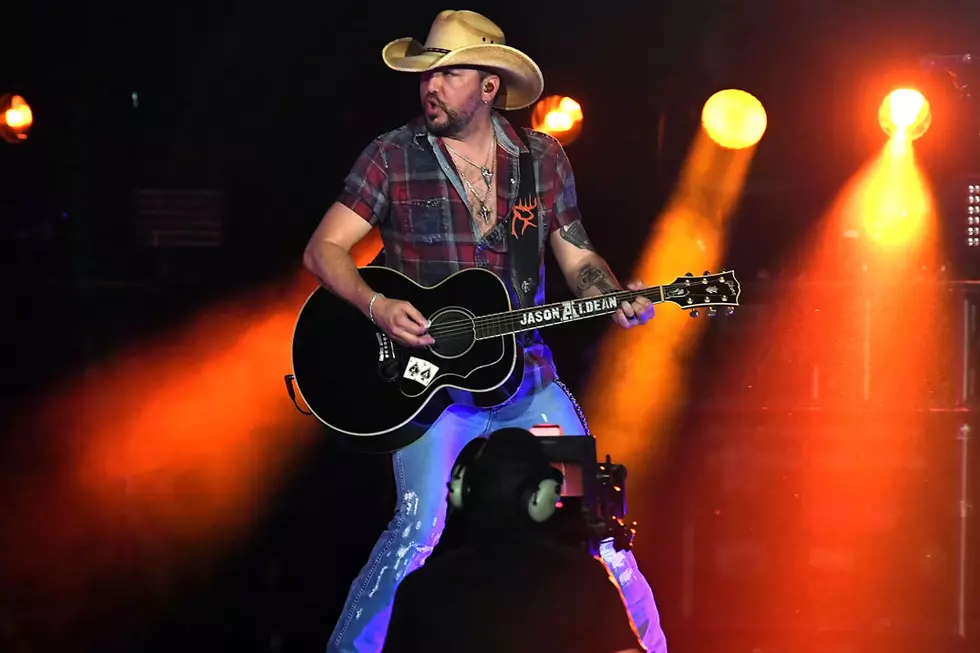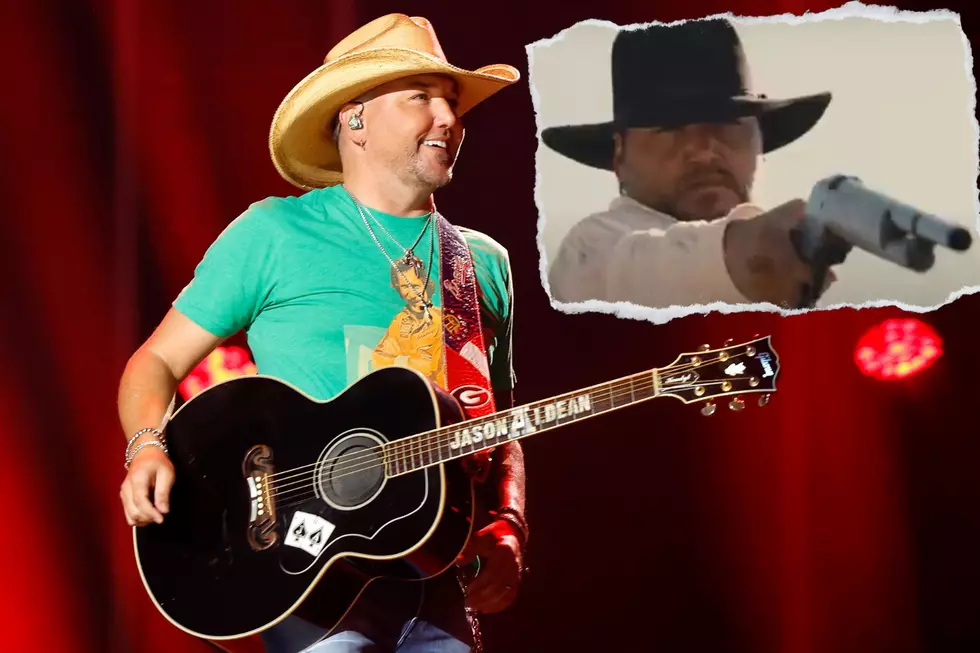
Interview: Jason Aldean Stays True to His Foundation With ‘9’
Jason Aldean has a method, and he's sticking to it.
Aldean stays true to his brand on his new album 9 — an album that puts his signature blend of country and rock at the forefront. In a conversation with Taste of Country about his latest project, the singer opened up on his approach to making music and his commitment to the method of recording songs that stand out to him, regardless of public opinion.
Throughout the interview, the country superstar drops bits of insight, admitting that his main goal is to make music music for himself while counteracting critics' claims that he's stepped out out of his comfort zone.
Ultimately, the ACM Artist of the Decade knows who he is as an artist — a mentality that's rewarded him eight (now nine) successful albums.
What was your mentality going into this album?
I'm one of those people, I try not to overthink things too much. I think if you start overthinking things too much, you just make mistakes. For me, it's always been about finding great songs and going in and cutting those songs the way I want to cut them and the way I want to hear them, but it all starts with songs. I've never gone in and said, 'I want to make this album more of a rock album or more of a pop album.' It's more about finding things that I think are cool and giving fans a great album, whatever those songs may be.
Over the years, I've set myself up, because I do have so many influences. I've been able to go cut an album — and it's not weird to hear a rock song on there with a pop song and maybe something that's a little more blues. We can put even hip-hop. We can do whatever we want on those records, and it's always funny to me when I hear critics talk about our albums like, 'I wish Jason would get out of his comfort zone on songs.' I'm like, 'we run the gamut on it, we cut an album that's scattered across the board.'
We're going to continue to make records and do them the way we always have and it's naturally going to go in the direction it goes. But I never go in with a preconceived notion of how we're going to cut an album, ever.
It's interesting you brought up the point about critics saying they want to see you get out of your comfort zone. Do you feel like when you record an album that you're in your comfort zone, or are you always trying to branch out?
I just feel like I'm cutting songs that I like. It's songs that I enjoy cutting, and then when we get in the studio, it's going to sound the way it sounds because it's us playing on it. It's what makes my records sound like my records. I feel like as a fan of music, I used to hate when I would be a fan of somebody and I loved what they did, and then the next album it would be completely different than what I liked about them.
My thing is, I make music for me. I don't mean this to sound bad, but I don't make music for fans — I make it for myself and I make things that I think are cool that I enjoy doing that I want to go out and sing every night, and I hope there's a fanbase that enjoys it. I feel like the fanbase that I have obviously likes what we've done over the years, which is cool, because that's what I do, and if you like what I do then you're going to like this record.
So that's what I mean by overthinking things. I cut things the way I cut it, and I cut it for myself. I want to cut songs that I want to go out and sing, I have to sing these songs a million times for the rest of my life, I want to like them.
If you're going to wait two years for us to put out an album, then I want it to be worth your while. I want to give them their money's worth.
One of the things I thought was interesting lyrically about this album was the fact that a lot of the songs seem to be about breakups and heartache and missing somebody. How do you connect with those types songs?
I don't care if I could be going through the worst thing in life and this is a happy song — if it's a great song, it's a great song. But I also feel like when it comes to emotions, just going through life, we all go through ups and downs and lefts and rights and we may not be going through something at that particular time, but you probably have in the past or you know somebody's that going through that. So when I hear a song, when it's something that hits me, it's like, 'Damn, I've been there. I know what that feels like.'
I just feel like a great song's a great song. If I hear one and it's a breakup song or a heartache song, that's country music — that's what it was built on.
It's like drinking songs — I've had people go, 'Man, you have a lot of drinking songs on this record.' I say, 'Well, they're all great,' and to me they all come from a different angle, they're not all saying the same thing. "Champagne Town" is a lot different than "I Just Came Here to Drink." So it's all coming from different places and they're all really good, and so I couldn't look at them and go, 'Well, I can't, I've already got too many drinking songs.' I don't do that.
Is there a song that's most personal to you on this album, or one that hit you when you first heard it?
"Keeping It Small Town," to me, was kind of cool. It's one of those songs that talks about simple life. There's some lyric in there that's really cool: "Yeah we just trying to be 'bout half good as our daddies / Still trying to make a name of our own / Find a little girl you can roll with and ride with / And make a good life with."
It's kind of what we all strive to do — we all look up to our dads and we want to make them proud and have our families. So there's stuff like that that hits me where that's just a really great lyric.
You said you want fans to get more than they bargained for with this record. So how do you define that, 'More than they bargained for'?
I think as a fan, when you love an artist, you get excited when an artist puts out an album, and sometimes you wait two years in between albums. I feel like if you're going to wait two years for us to put out an album, then I want it to be worth your while. I want to give them their money's worth. And any more it's even trickier because everything's going more towards a singles driven era, and it's almost like the days of making full-length albums ... you can almost see it clicking away. It's not going to be a thing for very long, and I hate that as a fan of music.
I used to love going and buying albums and some of my favorite songs were album cuts that never were on the radio. So I hate the way it's trending — for me, it's like, 'Well, everybody else is cutting back, I want to give them more.' I just love making albums and I hope that I never have to do it on a singles-driven basis, but if it's what it comes to, it's what it comes to, but I hope I never have to do that.
Jason Aldean Has One of the Top 2000s Country Albums — Find Him Below!
More From Taste of Country






![Inside Jason Aldean’s Love Story With His Wife, Brittany [Pictures]](http://townsquare.media/site/204/files/2019/03/jason-aldean-wife-brittany-relationship-pictures.jpg?w=980&q=75)
![Jason Aldean’s Daughter Just Might Have a Future in Law — Here’s Why [Watch]](http://townsquare.media/site/204/files/2024/03/attachment-JasonAldeanBrittany1.jpg?w=980&q=75)

